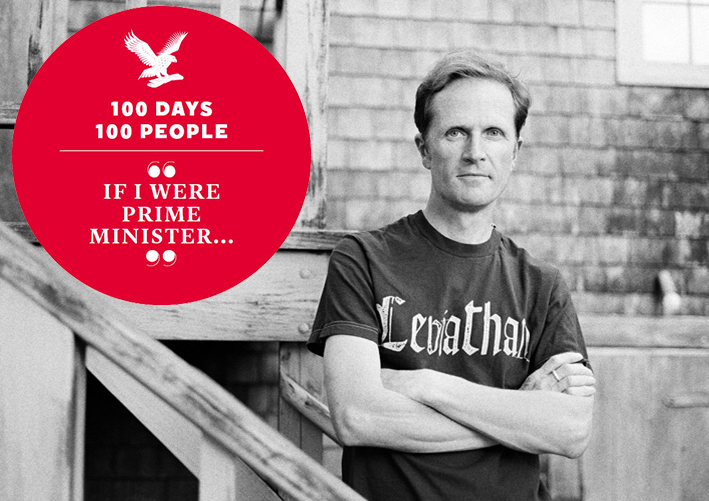If I were Prime Minister: I'd clear up the shore, and make a daily skinny-dip compulsory
Our series in the run-up to the General Election – 100 days, 100 contributors, but no politicians – continues with the English professor and writer

Your support helps us to tell the story
From reproductive rights to climate change to Big Tech, The Independent is on the ground when the story is developing. Whether it's investigating the financials of Elon Musk's pro-Trump PAC or producing our latest documentary, 'The A Word', which shines a light on the American women fighting for reproductive rights, we know how important it is to parse out the facts from the messaging.
At such a critical moment in US history, we need reporters on the ground. Your donation allows us to keep sending journalists to speak to both sides of the story.
The Independent is trusted by Americans across the entire political spectrum. And unlike many other quality news outlets, we choose not to lock Americans out of our reporting and analysis with paywalls. We believe quality journalism should be available to everyone, paid for by those who can afford it.
Your support makes all the difference.If I were Prime Minister we would breathe clean air. Recent results show that Southampton, the city in which I live and work, was named last year by the World Health Organisation as one of the nine most polluted places in England - despite its seaside setting and proximity to such apparently pristine areas as the New Forest. It seems unconscionable that in the second decade of the 21st century we should inhale air polluted on an almost Victorian scale. I admit that as I get about by bike, I am biased on this account. But you would be too, if your supposedly healthy morning ride to the beach was fetid with diesel fumes.
Once I get to the beach - hopefully not accompanied by Boris Johnson - my prime ministerial powers will have also begun to clear up the shore. And not only from the visible debris of plastic bottles, tampon applicators and monofilament discarded by lazy anglers. (I once helped free a swan here which had become trussed up in line like a turkey). I'd also tackle the insidious way in which plastic enters the marine food chain. Researchers at my university, Southampton, note that plastic production has increased from 50 million tons in 1950 to 245 million tons in 2008, and can take 1000 years to degrade in the sea, where much of it ends up. We need to stop this petrochemical tidal wave. Research by Plymouth University shows that plastic fragments in the sea into microparticles the same size as copepods, the minute zooplankton on which whales feed. Inevitably, we are also consuming the stuff, too. We may yet become part plastic.
We desperately need a greater awareness of the impact which our relentless desire for economic growth is having on the sea. We're an island nation; there is nowhere on our little chunk of Europe that is more than seventy miles from the coast. Yet we defy what Herman Melville called 'the ocean's skin' - that liminal membrane which separates us from the element that also sustains us. One reason why global warming has not yet overwhelmed us is because the world's oceans have acted as a giant carbon sink, absorbing the increased heat caused by climate change.
In a recent article in The New Yorker, Jonathan Franzen argued that as much as we like grand gestures on climate change, it is the local schemes which can have more effect. Indeed, they may be the only way left to ameliorate the inevitable, he says. Here on our little archipelago, we need to implement the marine reserves supported by such organisations as the UK's Wildlife Trusts. Again, I'll confess a vested interest. I swim in the sea. Every day, all year round. Like many people, to me the sea represents freedom.
But should that be a freedom for trawlers to rape the sea bed, destroying cold water corals which can be thousands of years old? Or, for that matter, should the sea be a racing track for jet skis churning out as much fuel into the water as they burn up - not to mention the noise they generate? The sad thing is, the sea, for all its majesty and beauty, is now regarded as backdrop to our modern world. Its silence is its downfall. We need to remember that without it, we wouldn't exist. And I'd have nowhere to shiver on my chilly spring morning swims. My last prime ministerial diktat? Compulsory daily skinny dipping. That'd shake things up. Literally.
Philip Hoare is professor of English at the University of Southampton, and author of Leviathan or, The Whale and The Sea Inside (both Fourth Estate). Catch him on the beach on Radio 3's 'The Essay'
Join our commenting forum
Join thought-provoking conversations, follow other Independent readers and see their replies
Comments